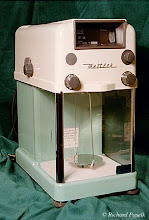Today we loaded up into the MS-TCDC Land Cruisers for a bumpy drive on muddy, washed-out roads up the slopes of Mt. Meru. We were served coffee and tea at a small farm house that is a success story of development aid. The waste generated by the handful of cows and goats kept there is collected into an underground container so that the methane can be collected and used for cooking. The mountain sides had previously been clear-cut for monoculture, making them susceptible to heavy erosion from wind and rain. With help from U.S. and European NGO's, the fields have now been terraced, the edges supported by banana trees and spruce trees whose roots hold the soil in place. Various crops are grown on the different small patches: potatoes, maize, coffee, and more. Some is kept for the family, and some is sold down the mountain. This practice has been implemented all over the mountain. The farm we visited today is part of a tour program that has been started, the proceeds of which are used for community projects such as school buildings.
We walked for several miles over the lush green mountain side. One stop on our trek was a traditional home compound of a Masai family. We in the west usually hear about the nomadic cattle herders of the plains. Today we learned that some Masai long ago found their way up into the mountains and took up agriculture. They live in large, round, thatched-roof huts with walls made of a mixture of manure and clay. At night, the cows and goats are brought inside to help keep the family warm. The mother shares the bed with the youngest child; the father sleeps at the door. Young boys will sleep at the door with the father, but when they are too old the parents build them another hut next door. Every seven years, the adolescent boys who have been deemed ready make a temporary hut and stay there for a month or more, receiving training and wisdom from their elders in the way of the Masai warrior. Then they are circumcised and welcomed back into the community as men, the caretakers of their society. (Female circumcision was practiced in the past, but is now illegal in Tanzania and quite rare).
As we learned about and saw this way of life, a few of us began to wonder if our own culture is missing something by not having such an obvious rite of passage into adulthood. Not that I'm advocating adult circumcision without the benefits of anesthesia. But I do wonder if a lack of a real and meaningful mark of adulthood doesn't have something to do with my generation's inability or unwillingness to confidently assert the title and responsibility of adulthood.
Another question, quite unrelated: what is it that we (EWH students, Americans, NGOs) hope to accomplish here in Tanzania? The West calls places like this "developing nations" or even "under-developed nations", implying that we feel Tanzania ought to develop. Into what, I wonder? Will a developed Tanzania have room for the Masai of the mountains? Already their culture is disappearing, their religion being replaced by Christianity, there round mud huts by square brick shanties. Will Mt. Meru one day look like the terraformed neighborhoods of Seattle? I came here to fix medical equipment. I'm sure the residents of this neighborhood would appreciate that, as they do visit the hospital when very sick or injured. The society that builds ECGs also builds high rises. Given the opportunity, I wonder if the Masai would prefer to live in a mud hut or a house or a condominium. I suppose my work here will help to give them that choice to make. They certainly don't have it now.
Lala Salama (peaceful sleep).
Saturday, June 14, 2008
Subscribe to:
Post Comments (Atom)

2 comments:
Awesome writing there Kristian. Glad to see you made it all the way across the world in one piece. Now just come back to us in the same manner!
Hey! Looks like your enjoying your time there so far. Btw those ants in your pictures are HUGE!! I have never ever seen an ant so big :) Stay safe!
Post a Comment